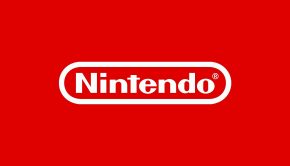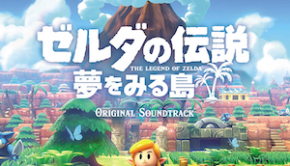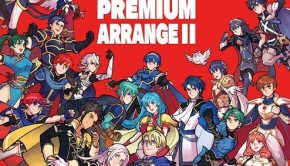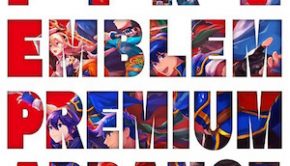Fire Emblem -Awakening- Original Soundtrack
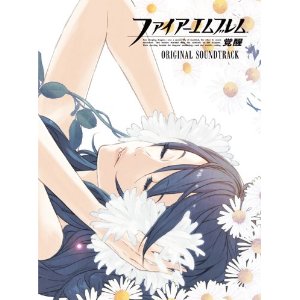 |
Album Title: Fire Emblem -Awakening- Original Soundtrack (Fire Emblem -Kakusei- Original Soundtrack) |
| Record Label: Tablier Communications |
|
| Catalog No.: TSCM-0008/13 |
|
| Release Date: March 27, 2013 |
|
| Purchase: Buy Used Album |
Overview
Much hype surrounded the 3DS exclusive title Fire Emblem: Awakening, the newest game in the long-running tactical role-playing series. According to Intelligent Systems, Awakening was meant to be the last game in the series due to the declining sales that Fire Emblem had faced in the previous years. Fortunately, the game received widespread acclaim and garnered excellent sales, ensuring that the series would still stay around. With new gameplay features and an engrossing story, Awakening was fresh and familiar at the same time and appealed to both new and veteran fans of the franchise.
The soundtrack team consisted of Hiroki Morishita, a virtually unknown in-house composer at Intelligent Systems, and Rei Kondoh, a T’s Music employee well-known for his work on the Okami, Bayonetta, and Sengoku Basara franchises. Fire Emblem veteran Yuka Tsujiyoko returned from retirement to also offer a small contribution to the score. Boasting improved sound design and live instrumentation, is this another hit for the series?
Body
Awakening boasts the largest and most comprehensive soundtrack in the series, spanning a whopping four discs of music. Additionally, it includes a special fifth “data disc” containing the complete library of the game’s sound effects and voice acting, an extra piano track, along with an HD version of the opening movie. It’s by no means anything special, but it will no doubt be an interesting treat for die-hard fans of the series. But even ignoring the bonus disc, this is definitely a meaty score. Other RPGs like Xenoblade and Okami are known for their lengthy soundtracks, but Fire Emblem: Awakening has the rare distinction of being a portable game. This is a game that truly demonstrates how far handheld scores have come. From the primitive sounds of Tetris and Super Mario Land, Awakening only proves that portable systems can have scores on par to their cinematic console counterparts.
The first disc opens with “Id~Beginnings” a brief ambient track with distant percussion and string plucks. This immediately segues into an interpretation of the series’ well-known and fan favorite main theme. Despite being obviously synthesized, “Omen / Main Theme” is masterfully mixed and is a great opener to the long journey ahead. The overall soundtrack doesn’t rely too much on the main theme, instead using it sparsely throughout. This is a wise decision on the composers’ part, as it makes the piece sound much more effective and meaningful when used in context. “There are better places to take a nap than on the ground, you know?” and “Id~Serenity” establish the thematic continuity that holds the album together. The piano makes its first appearance here, an instrument that is used several times in later tracks. The accordion additionally adds melancholic backing which, oddly enough, reminds me of Tomohito Nishiura’s Professor Layton scores. Being the main theme, the “Id” theme itself makes several appearances throughout the album. “Prelude” is no doubt a throwback to the classic RPGs of the 16-bit era, with its heroic and inspiring melody, while “Prelude~Ablaze” expands upon the piece by adding chorale elements and heavier orchestration.
Moving to the first battle tracks in the game, “Assault” and “Assault~Galvanised” are both early highlights. The former receives synth orchestration that at times almost sounds unmistakable for a live orchestra. The theme is prevailing and militaristic, but subtle enough for the player to concentrate on planning out their battle tactics. The second version is merely at a quicker and direr tempo, though there isn’t that much to differentiate the two. The darkness continues with “Gods, have the Risen spread this far?” and “Menace – Intro”, both cinematic but forgettable tracks. They up the main track “Menace”, which captures how the atmosphere of the game has shifted to dark and foreboding, yet our heroes carry on and carefully plan out their strategy. “It appears the capital was spared the chaos” is more solemn in tone. The instrumentation is sparse, though it’s likely meant to be background during cutscene dialogue. “Something is very wrong” on the other hand is suspenseful and chilling, performed by rustic cello along with high-pitched synth in the background. “I mean it. Go!” sounds like a fast-paced chase-scene that’s likely background for one of the cutscenes.
“But, Frederick, it’s nearly dark!” and “Oh, it’s not so bad, Lissa. Just a healthy little walk!” are both warm orchestral themes, with the former even utilizing live violin. These type of personal themes are used for the many “interaction” moments between characters in the player’s party. Among other story-driven tracks, “Farewell…my friends…” hints at traces of beauty, but is sadly underdeveloped, while the pizzicato-infused “We’d best prepare for combat, just to be safe.” is an excellent piece that’s meant to be build-up for the upcoming battle. “Duty” has a memorable theme that features excellent piano chords and woodwind notes, while its expanded version “Duty~Ablaze” uses a fuller militaristic sound. “Here we are! The Shepherd’s garrison,” suffers oddly enough from sub-par orchestral synth, which is strange seeing as how previous tracks demonstrated otherwise. “Negotiation’s not my strong suit…” is a brassy darker theme, while “Agh! Won goph in mah mouph! Blech! Ptooey!” (yet another long-winded title!) closes Disc 1 on a more comedic note.
We continue with the first track of the second disc, “Destiny.” Subtly orchestrated with a memorable theme along a great range of instruments; this is another gem on this album. Although many of the elements are synthesized, this hardly matters since the theme is so good. The (even better) “Ablaze” variation adds more brass and heavy strings in addition to sweeping harp chords, flute whirls, and piano keys. Keeping with the action tracks, I did not like the two “Aggression” tracks as much. Both sound forced and generic, though they probably work better in-context with the game. Speaking of which, “Now that’s a declaration of war if I’ve ever heard one!” is another effective story piece that not much to listen to on a stand-alone basis. Disappointments continue with the underdeveloped brass solo “Miscreant – Intro”, the 30 second cue “No reaction…. Was I wrong then?”, and the even-briefer “Leave me… Save yourselves…if you can…” But there are still some other highlights on the second disc, among them the fully-fledged, bombastically-orchestrated “Miscreant” and the solemn Dragon Quest-esque “I’ve never seen one fall so gracefully”. The oddly named “……” while simple, is still stirring and beautiful. The piece completely relies on distant piano bars that evoke a dreamlike atmosphere.
“Don’t speak her name!” is one of the longest tracks on the album, and it’s simply gorgeous to hear. The synth orchestration actually sounds like a real live orchestra, and the incorporation of the piano really makes this piece shine. Speaking of beautiful tracks “And what if I can’t? What if I’m not worthy of her ideals?” is excellent with a perfectly performed duet between the piano and violin solos. “Dry your tears, love. This is not good-bye.” feels both sad and hopeful at the same time, likely reflecting upon the track’s title. Moving on to more epic additions, “Divine Decree” combines orchestra, harpsichord, and choir vocals. Some instruments appear to be of lower quality synth than others, but it’s a mostly solid track. “Divine Decree~Ablaze” is an improvement though, with higher quality instrumentation and a more intense flair. “You don’t know the first thing about peace. No man does!” is repetitive and forgettable while the two “Mastermind” tracks are somewhat generic but expertly mixed with heavy string tremolos and chilling chorus. The final track of Disc 2 “Grima has returned to slumber.” gives us a moment of rest with lush orchestration and solo violin.
Moving on to Disc 3, “Conquest” is a soothing piece that utilizes light guitar strums in addition to synth horns which hint at the Fire Emblem main theme. The “Ablaze” version increases the tempo and adds more instruments with higher quality synth. “We should turn in for the night.” begins off slightly comically with xylophone, but as more orchestration gets added on; the piece becomes more serious. “The Vaike never forgets! I just don’t always remember,” on the other hand, depicts light-hearted moments with its sleazy brass themes and playful pizzicato. The xylophone stays consistent throughout and is later joined by piano. There’s not too much difference between “Training” and “Training~Galvanised,” both being heroic battle themes; with the latter only having slightly more instruments. “Don’t you put any stock in this destiny hogwash!,” “Rival – Intro,” “Rival,” and “Let’s see what I’m capable of now.” are really just more of the same: heroic themes that work in-context with the game, but sound generic when listened to alone. The piano-based “Such bonds are the true strength of this army” and “You deserved better from me than one sword…” are also enjoyable, the former a simple jazz track, the latter more melancholic.
There’s plenty of other filler in the third disc. “I carry only the finest” is an underdeveloped march, while “Open for business!” is subtle unobtrusive piece, likely used for when the players shop for weapons and items. I found “Shh… Easy now, Girl. I won’t hurt you.” and “Someone has to save you from your good intentions” as uninteresting, while the two “Storm Clouds” tracks as effective battle tracks. However, there are a few more highlights here. “You may call me Marth” and “Ha ha! Yes, it will take some getting used to!” are both beautiful, especially in regards to the live violin recordings. The combination of harp, flute, and flourishing orchestra make “You have power… like mine.” stand out. “Misericorde” is also notable too, but for a different reason. Unlike the rest of the soundtrack, this piece utilizes traditional Japanese instruments. While not special in the grand scheme of things, it’s a welcome change from the series’ more traditional sound. Closing off Disc 3 is “Id~Dilemma” which calls back to the first track of the album with its ambient synth and accordion.
We now reach the fourth and final disc of the soundtrack and it’s appropriately got plenty of darker, climactic moments. “Run all you like – you can’t escape fate” and “Chaos” are atmospheric gothic pieces, the latter building into the faster-paced, almost industry “Chaos~Ablaze” increases the tempo and sounds almost industrial. Sadly, the ambient “Malefactor – Intro” really goes nowhere, while the poorly synthesized orchestral “Malefactor” feels repetitive and forgettable out of context. “Annihilation” and “Annihilation~Galvanised” both use distorted piano, synth, and organ, with the latter merely incorporating more orchestration. “Monstrosity – Intro” is a disappointingly generic ambient piece that has zero development, while the full track is an orchestral choral piece notably using a drum kit. “Grima. It’s all over…” similarly is underdeveloped, only running at a brief thirty seconds. Nothing too memorable to be perfectly honest.
As the soundtrack reaches its climax, there are several reprises of the main theme. These the melancholic accordion-based “Id~Sorrow”, the ethereal piano-based “Id~Darkness”, and the march-styled “Id~Return”. Clocking in at eight minutes, “Id~Purpose” is the longest track on the album, and the most full-fledged version of the main theme. It starts off with accordion, accompanied by brass and strings. At the thirty second mark, the chorus joins in, giving their own rousing version of the melody. After alternating between instrumental and chorus, the male choir section sings a second heroic melody at around 2:35. The female section sings the harmony, with both sections molding into a variation of the Fire Emblem main theme. Leading up to the halfway point, each section slowly fades away, returning to the original accordion once again playing the Awakening main theme. It then loops once more before fading out. Simply put, this is one of the best tracks on the entire album; stirring up all the right emotions.
But we’re not done yet! The violins come back with “Old Battlefield,” delivering a beautiful romantic battle theme. Despite having a running time of 2:01, “There are better places to take a nap than on the ground you know. (Reprise)” is exactly the same as the original track, oddly having a full minute and a half of pure silence after only 20 seconds of actual music. The bonus tracks “Champion” and “Champion Ablaze” are battle themes for a stage unlocked after beating the game once. These were the only new tracks that Yuka Tsujiyoko composed for the game and channel back to the classic military sound of the franchise. While pretty good, we’ve heard similar themes on the album dozens of other times. “Id~Hope” is the final version of Awakening’s main theme, again being an orchestral piece. The final six tracks are merely variations of the Fire Emblem main theme as if we needed them. The additional music for DLC expansions is not included here.
Before I close off this section, I’d like to momentarily mention something that rarely gets talked about on this site: the actual packaging of the soundtrack. Tablier Communications spared no expense in delivering a premium package to the fans. Five shining discs placed in a high-quality fold-out digipak case with a glossy plastic slipcover, this is one beautiful looking set. The icing on the cake is the included 24 page booklet that features the game’s gorgeous art along with the track listing. These bonuses definitely give buyers their money’s worth when purchasing this set.
Summary
I would describe about a third to a half of Fire Emblem: Awakening’s music as memorable, while the rest to be only fitting when put in context with the game. This is no doubt a very ambitious score that’s a marvel of the 3DS’ sound capabilities, but it’s very uneven. Some tracks have excellent synth and convincing orchestrations that would be difficult to differentiate from an actual live orchestra. Others suffer from rather poor synth and are lazily composed. Many of the battle themes, while good, feel very similar to each other to the point where it feels that there’s little variety at times. Still, the live instruments like the violin and piano are a welcome addition despite being sparsely used. I wish that eventually Fire Emblem will have a fully orchestrated soundtrack. Level 5’s Time Travelers and Professor Layton vs. Gyakuten Saiban have proven that it’s very possible to have such a high quality soundtrack on handhelds. Hardcore fans of Fire Emblem will no doubt be satisfied with most music though, especially the ones who’ve actually played Awakening. To everyone else though, it has my cautious recommendation assuming you’re willing to sit through a few similar sounding and underwhelming tracks in order to get to the real gems.
Do you agree with the review and score? Let us know in the comments below!
3.5
Posted on April 14, 2014 by Oliver Jia. Last modified on April 14, 2014.

